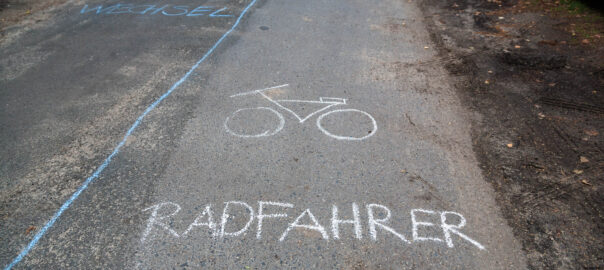
Alle Beiträge von Webadmin

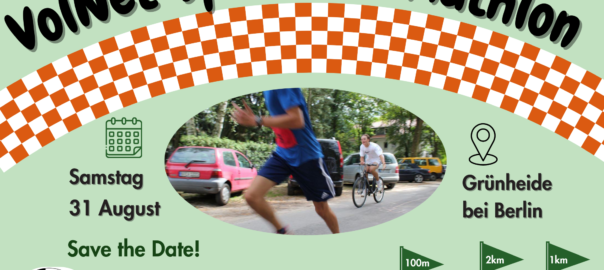
Der VolNet-Spenden-Triathlon ist zurück
Anlässlich des 20-jährigen Jubiläums von VolNet werden wir den VolNet-Spenden-Triathlon dieses Jahr wieder aufnehmen. Am 31sten August 2024 heißen wir euch wieder im Christian-Schreiber-Haus willkommen. Für viele hoffentlich ein Grund in Erinnerung zu schwelgen und vielleicht schon leicht verstaubte Fahrradoutfits und Schwimmkappen wieder aus der Versenkung zu holen. Wir würden uns sehr freuen, wenn das Event nicht nur im Zeichen der Rückbesinnung steht, sondern auch neue Generationen von Sportbegeisterten und ehemaligen Freiwilligen zusammenbringt. Gleichzeitig ist das Ziel der Veranstaltung die Modernisierung der Infrastrucktur auf Benna Kunda zu finanzieren, sodass Benna für VolNet Gambia, die Freiwilligen und lokale Organisationen noch attraktiverwird als ein Ort für Workshops, Theater und natürlich Volleyball.
Unter der e-mail Adresse könnt ihr bereits jetzt Euer Interesse bekunden und werdet von uns auf dem Laufenden gehalten.
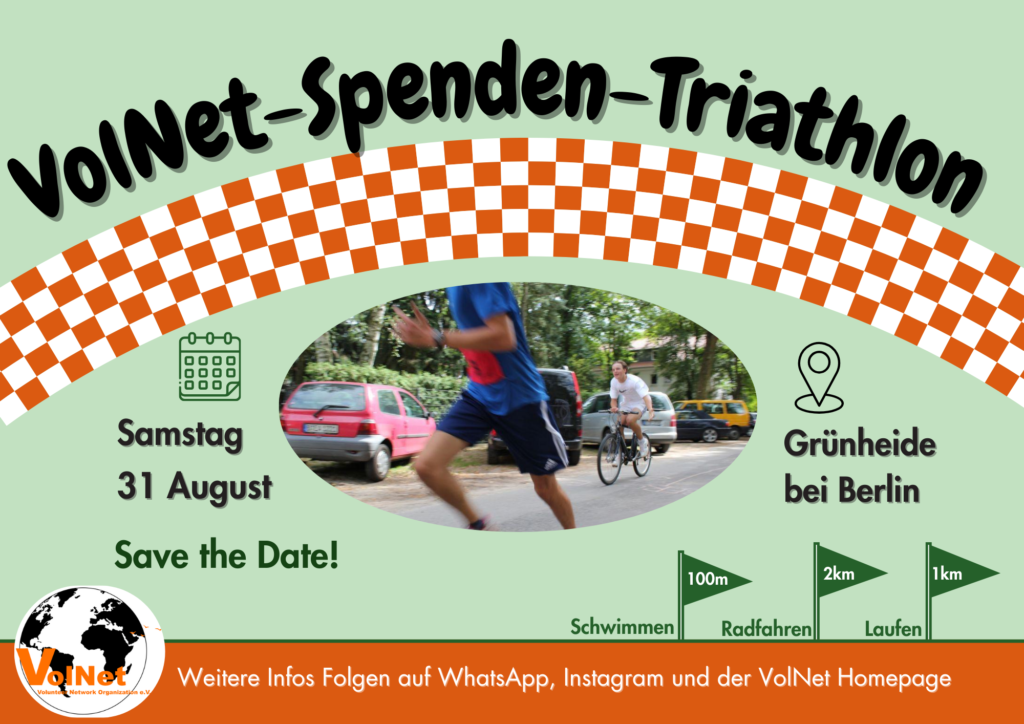

Renewable electricity integration for sustainable developement
Ihr Lieben!
Es ist Zeit für unser nächstes Event in der Reihe zum Thema Klimawandel weltweit
Am 23. April um 19 Uhr werden uns Tobi Liersch und Rock Segnon von der GiZ Benin Einblicke in aktuelle Themen und Herausforderung bei dem Ausbau der Erneuerbaren Energien in Deutschland und Benin geben.
Bitte teilt das Event & erscheint zahlreich!
Zu Eurerem Komfort hier noch der Zoom link: https://uni-leipzig.zoom.us/j/66467794940?pwd=UGJUZFNxSGtiYkV3WWxoRUhYSGF2UT09
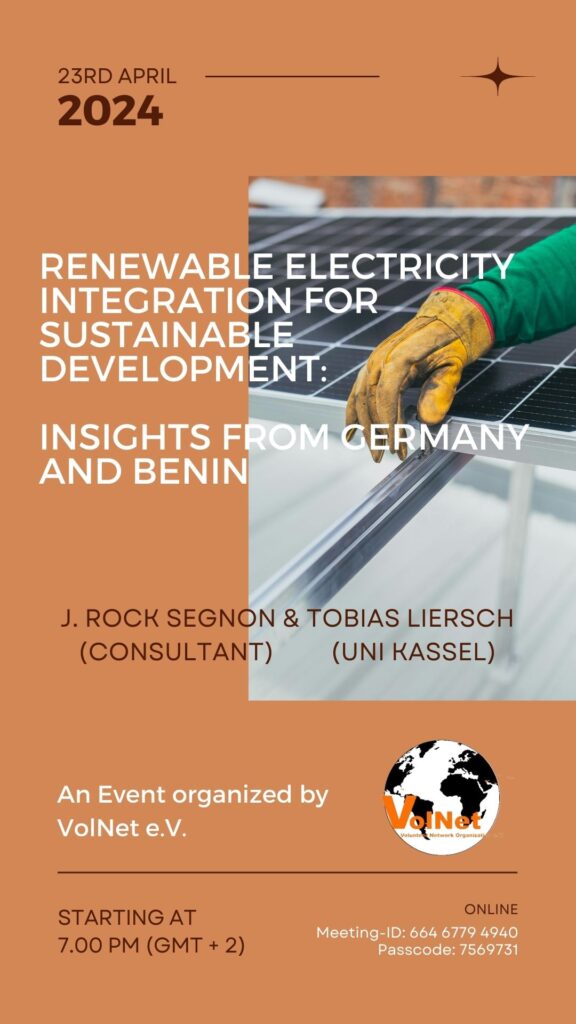
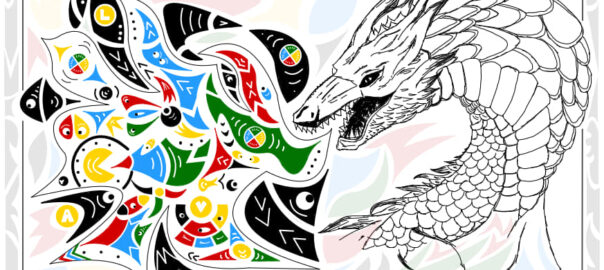
Postkarte: Verzierung der Fischerboote
Das Design der Karte ist in Zusammenarbeit mit einem Gambischen Künstler Namens Aziz entstanden, welcher größtenteils Fischerbooten ihre bunten Farben und faszinierenden Muster verleiht.
Ich durfte ihn bei einem seiner Projekte begleiten und unterstützen.
Er erklärte mir sein Vorgehen und auf was man achten sollte, wenn man einem Boot sein ganz individuelles Aussehen gibt.
Ich merkte recht schnell, dass sehr vieles seiner künstlerischen Intuition entsprang, er sich aber sehr wohl an einige Richtlinien hielt.
Man erkennt an oberem Design sehr gut wie sich die Farben voneinander abgrenzen. Etwas was mir Aziz direkt zu Beginn erklärt hat.
Insbesondere integriert er sehr gerne Augen und Ansätze verschiedener Tierkörper auf seinen Kunstwerken. Bei genauem Betrachten der Karte kann man dieses Merkmal ebenso dort wieder erkennen.
Der Drache entsprang meinen Gedanken, da mich die oftmals spitz-zulaufenden Formen in einer gewissen Weise an Flammen erinnert haben. Ich teilte meine Idee mit Aziz, welcher den Drachen sogar in eines seiner Designs übernahm.
Besonders die grellen Farben haben es mir angetan. Aziz erklärte mir, dass die Besitzer der Boote sehr oft ihre Länderflaggen im Design integriert haben möchten.
Die Boote Senegalesische Fischer strahlen demnach oft in den Farben Grün, Gelb und Rot, während Gambische Fischer ihre Boote eher in den Farben Rot, Blau und Grün bevorzugen.
Das Design meiner Postkarte orientiert sich demnach an den Farben der Gambischen, wie auch der deutschen Flagge.
Viel Spaß beim anschauen!

Die Bewerbungsphase 24/25 ist eröffnet!
Es geht in die nächste Runde!
Zusammen mit unserer Partnerorganisation VolNet Gambia und den Projektstellen haben wir uns entschieden: Auch im Jahr 2024/25 findet die weltwärts-Freiwilligenvermittlung von Deutschland nach Gambia über VolNet statt.
Der Startschuss für die Bewerbungen ist gefallen. Alle Formalitäten dazu findest Du hier.
Wir freuen uns, erneut in die Vorbereitungen starten zu können, und sind gespannt auf Dich!

Meine Einsatzstelle in der Upper Basic School Gunjur
von Simon Kretzschmar, VolNet Freiwilliger 23/24
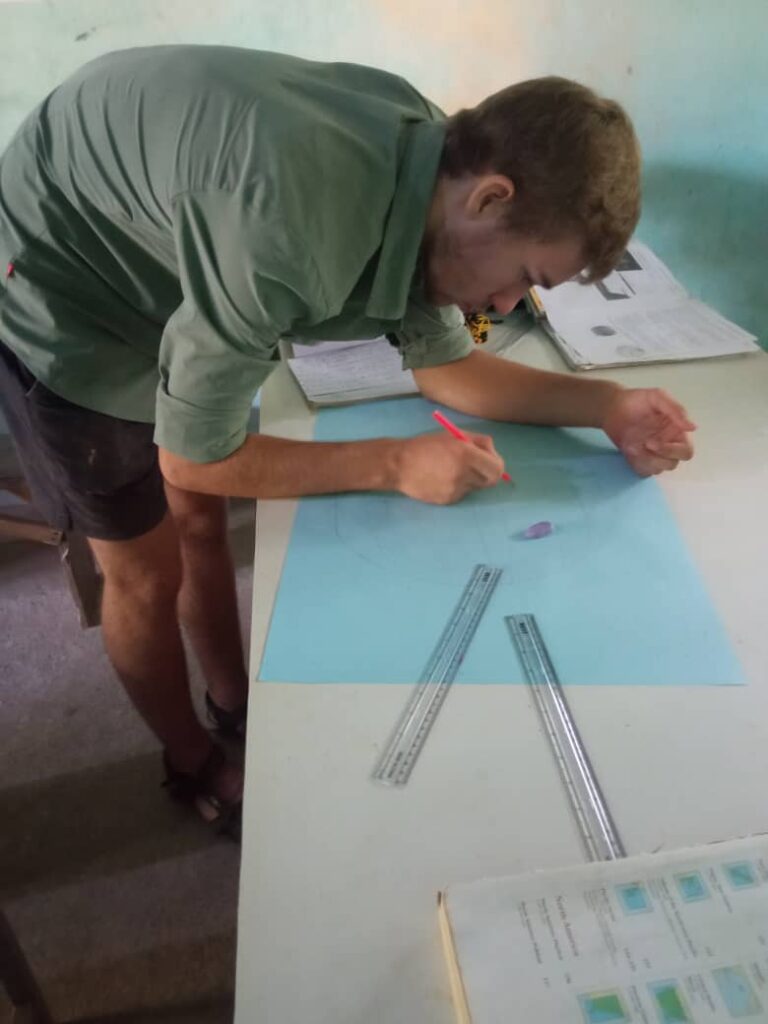
„Pass bloß auf, dass du dann nicht auch noch ein Lehrer wirst“ meinte ein guter Freund zu mir, als ich ihm vor einigen Monaten davon erzählt habe, dass ich für einen Freiwilligendienst in Gambia an einer Schule arbeiten werde. Und auch ich hatte am Anfang ein paar Zweifel: Ich habe jetzt mein Abi einmal geschafft – und gehe dann direkt wieder zurück ins System Schule. Ist das wirklich, was ich will? Nachdem ich angefangen habe, hier einige Wochen zu arbeiten, stellte ich fest: Schule ist anders, wenn man sie aus der Sicht des Lehrers erfährt und noch einmal ganz anders, wenn man als Volunteer aus Deutschland an einer gambischen Schule arbeitet.
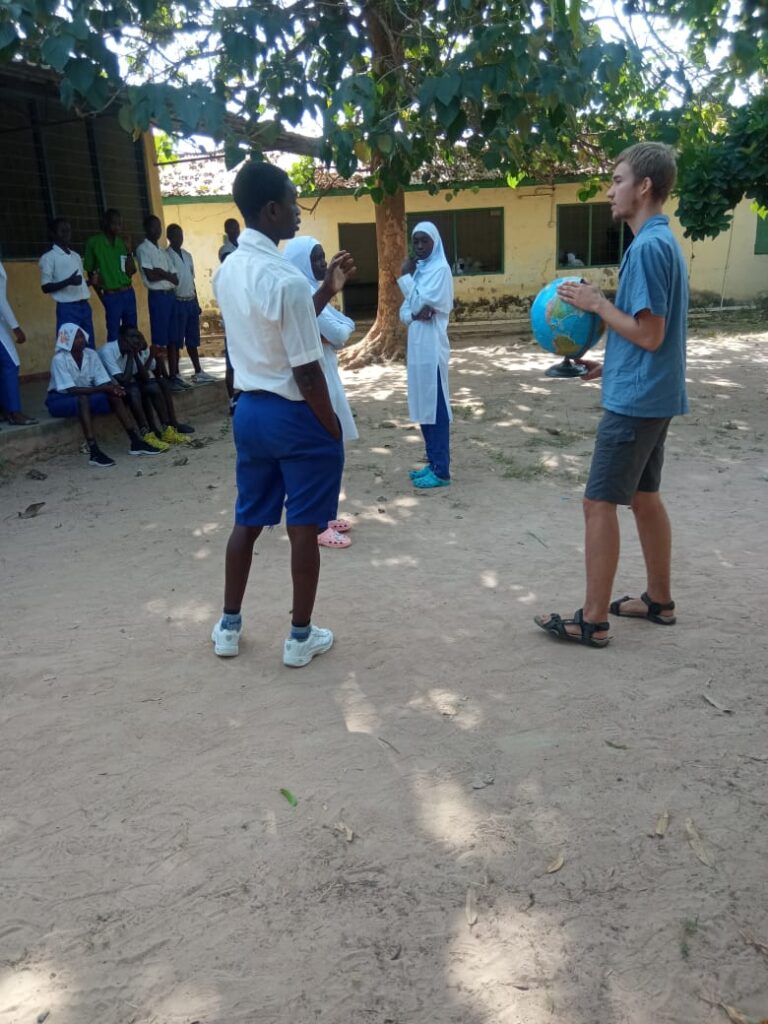
Eine 100%-ige Aufgabenbeschreibung von dem, was man an der Schule jeden Tag machen soll, kann man nicht geben, da dies individuell sehr vielfältig ausgestaltbar ist. Ich habe nach der dritten Woche für jeden Tag eine eigene Unterrichtsstunde (70 Minuten) bekommen, die ich in der neunten Klasse halte. Mir macht das sehr viel Spaß, da ich Teile meines Unterrichts häufig wie Gespräche und Diskussionen mit der Klasse gestalten kann, wodurch auch ich dann immer wieder viel von den Schülern dazulerne. Die Verständigung auf Englisch ist nicht durchgängig einfach, da man verschiedene Akzente spricht und außerdem auch einige Schüler*innen nicht wirklich geübt in der Schulsprache sind. Nach und nach pendelt sich jedoch ein gegenseitiges Verstehen ein. Frustrierende Normalität in (meinem) gambischen Schulalltag ist, dass es immer die berühmt-berüchtigte „letzte Reihe“ gibt, die halt mit den Gedanken wo ganz anders ist, aber auf der anderen Seite gleichzeitig auch immer eine Gruppe sehr aufgeweckter Schüler*innen, die man in ihrer Motivation alle Fragen immer gleich durch lautes Hereinrufen zu beantworten bremsen muss.
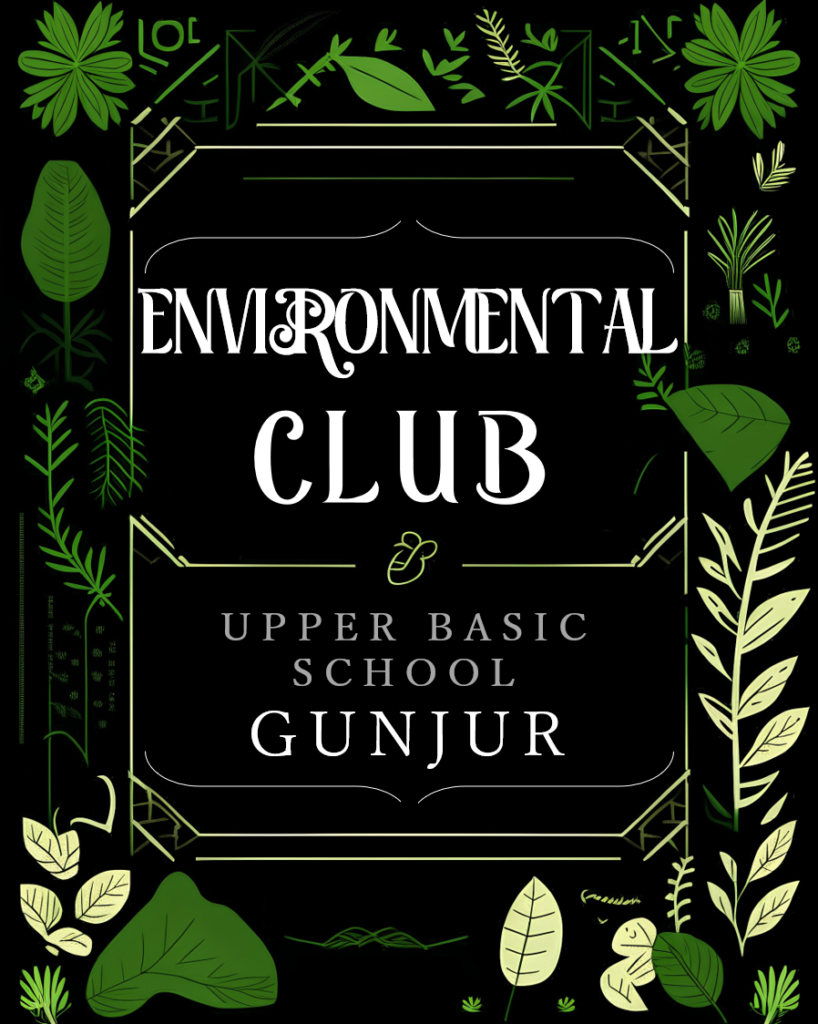
Schule ist aber bei weitem nicht nur Unterricht. Auch außerhalb davon gibt es gute Möglichkeiten und große Baustellen, an denen man sich einbringen kann. So haben wir hier zum Beispiel einen Computer-Raum und eine kleine Schulbibliothek, die beide für sich hin-verfallen und die einfach mal wieder etwas mehr Aufmerksamkeit, Zeit und Liebe benötigen würden. Was wirklich sehr gut läuft, ist der „St. Francis Drama Club“ mit ziemlich populärem Youtube-Kanal (https://www.youtube.com/@stfrancisdramaclub). Der zuständige Mr. Marena freut sich auf jeden Fall auch immer über Unterstützung. Mein aktuellstes Projekt mit den anderen SES- und Agricultural Science-Lehrern zusammen ist die Gründung eines „Environmental Club“ an der Schule, der dann Exkursionen und weitere Aktionen organisieren soll.
Schule muss also keineswegs nur Unterrichten bedeuten und auch als jemand wie ich, der nicht vor hat später Lehrer zu werden, hat man in dieser Einsatzstelle viel Spaß. Was einem auf jeden Fall gewiss ist: Man wird auch im normalen Gunjur-Leben immer wieder von Schüler*innen angesprochen oder als „Teacher!“ angesprochen werden. Und das ist wirklich ziemlich cool. Schule findet eben auch außerhalb vom Klassenraum statt.
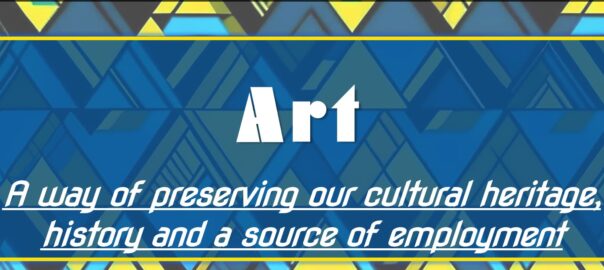
The 3rd Edition of “The GLADS-Benna Theatre Project”
We did it again! On the 17th December 2023, Gunjur Literary And Debating Society-GLADS, with financial support from VolNet e.V. and in partnership with VolNet Gambia, presented the third edition of „The GLADS-Benna Theatre Project“ under the theme „Art: A Way of Preserving Our Cultural Heritage, History and Source of Employment” in connection to SDG 8.
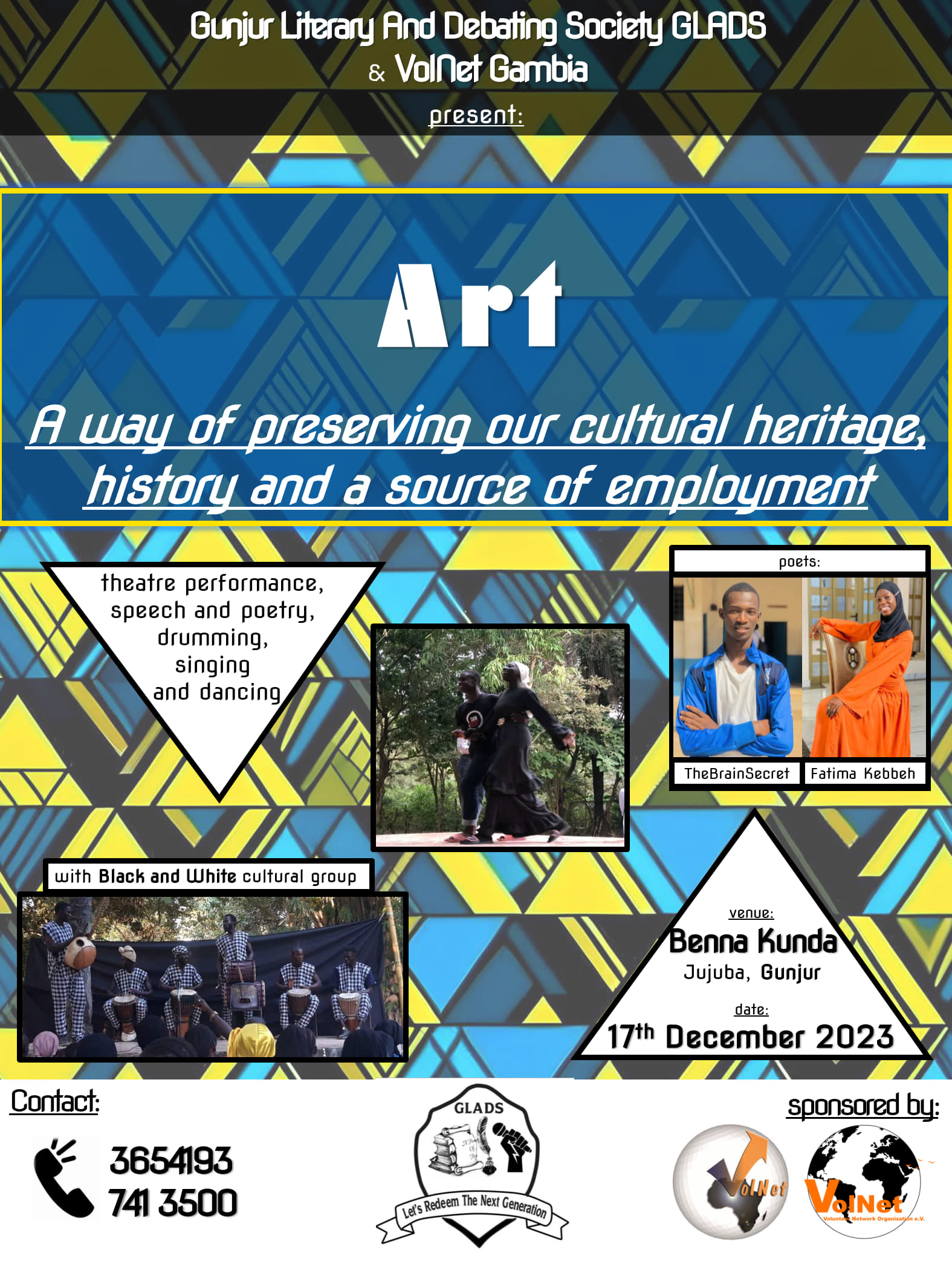
In what had seemed daunting to replicate, we were able to pull together yet another program, improving the diversity and quality of performances on stage to top off last year’s thereby bringing back magic and life to Benna Kunda while keeping the expenses as low as possible. With the bar raised so high from the first and second edition and the pressure to stage something better, GLADS spent the past weeks working hard and fiercely in constant communication with VolNet Gambia and other performing groups to present yet another exciting and insightful event.
Contrary to our fears, approximately 200 people showed up and constantly cheering at the performers and never wishing it ended, amazingly turning Benna Kunda into a theatre and dance club simultaneously for a moment.

Diversity and quality performance to satisfy the taste of our audience and wow them at every edition is critical to this project, so every year, we are always looking for what to add. When we started, it was just a theatre performance by GLADS, and the second edition added poetry and djembe drumming performances. In this edition, we included cultural dance, where we featured The Monkey Girl Cultural Dance Group; a group that is two months old and performing with us at Benna Kunda marks their first ever outing since its inception. This group will never forget Benna Kunda as it grows. Interestingly, the choreography they displayed on the 17th surpasses the age of the group. This denotes the foresightedness of this project; giving young people the free platform to horn their artistic talents and ideas.
GLADS, the grand performers of the day presented an interesting theatrical story in the local language, considering the audience, a story of love intertwined to the suppressed history of some Karoninka machinery warriors whose great exploits in the Foday Kombo Sillah’s Jihad wars is neglected and long forgotten. GLADS also presented some carefully scripted poems through its young rising poets. We also witnessed the performances of two guest poets in the persons of Fatima Kebbeh (Da Voice) and ThaBrainSecret. Black and White Cultural Band again rhythmically decorated the event with a few selected Djembe rhythms, exploring the origin and cultural significance of each of the rhythms before beating them in the most enchanting style that got the audience constantly on their feet in an irresistible way. We are confident that this year’s performance has risen the bar yet to another level.
Thus, we are grateful to everyone that made the event a success.
First, to The Monkey Girls who pulled up with multiple amazing and fun performances. The Black and White cultural band, who kept the vibes going and the people dancing. The young poets at GLADS who at the dying minute decided to mount the stage and face their fears to give us amazing and educational performances of their poems.
We also want to show our gratitude towards the people who left whatever work they had to join us for this beautiful event and brought life to Benna Kunda.

VolNet Gambia put in hard work in setting the stage, helping with other logistics and in publicizing the event to increase the number of the audience. For that we say thank you.
We also recognize the participation of the present volunteers as they were deeply involved in the planning and implementation of the program, helping with cooking and preparing Benna Kunda for the event.
We also remember two former volunteers of VolNet who started this project with us: Turending Gassama who suggested the idea to GLADS and worked through with us to the implementation of the first theatre project and we also remember Mia who joined the crew handling lights on the first staging.
To VolNet Germany we plead for more time to find the right words to express our gratefulness of your support towards the event and for constantly going down the path with us on every edition of The GLADS-Benna Theatre Project. We say “wir sind dankbar” to VolNet e.V.
We hope and look forward to working together on more editions of this impactful project.
Report by Ella, current volunteer at GLADS and Emil Gibba.